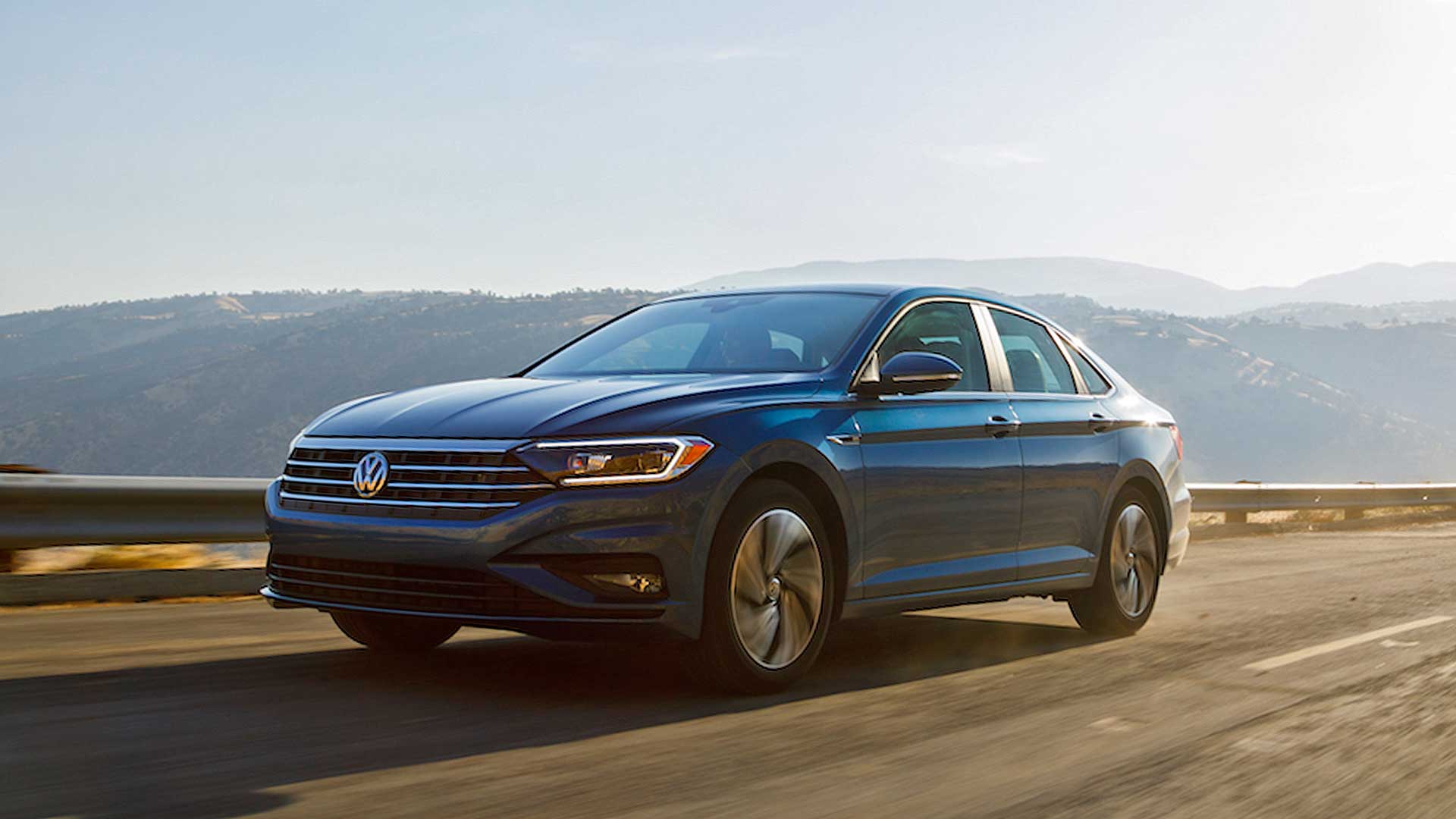With SUVs hogging the spotlight and sales, it might seem the worst possible time to try and revive a sedan franchise. But that’s the task Volkswagen faces with the Jetta it unveiled Sunday at Detroit’s North American International Auto Show.
If style is all it takes to move sedans, this VW has a shot: Crisp, layered, and expensive-looking, the 2019 Jetta looks far more appealing than its anodyne predecessor—and a serious competitor to premium compacts like the Honda Civic or Mazda3. The VW hits showrooms in the second quarter of this year, priced from $19,395, undercutting a base Civic by about $340.

VW unveiled the new version of its perennially best-selling model at the Garden Theater in downtown Detroit. On stage, the Jetta faithfully evoked VW’s latest styling themes, including a resemblance to the range-topping Arteon sedan that will replace the CC. The Jetta’s four-bar, full-width grille looks clean and modern, as does standard LED lighting, tastefully applied chrome and sharpened character lines. In the current vogue, the roofline traces a faster, coupe-like slope, but there’s still ample headroom for rear occupants. Built on the modular MQB architecture that underpins models from the compact Golf to the massive three-row Atlas, this roomier Jetta grows in every exterior dimension, including height. The wheelbase is 1.3 inches longer, at 105.7 inches, with shorter overhangs front and rear.
With its uncluttered Teutonic vibe, the interior will be familiar to people who’ve checked out the new Atlas or Tiguan SUVs. Consumers will see richer materials, soft-touch surfaces and optional, wraparound ambient lighting in 10 customizable colors. A rear-view camera is standard.
Up-level models offer the Audi-esque Volkswagen Digital Cockpit, with its reconfigurable driver’s display that includes full-screen navigation views. VW’s newest infotainment screen is mounted high up on the dash for easy viewing and reach. The center console is roomy enough to stow a standard iPad. Other available goodies include heated and ventilated front seats, a power driver’s seat with memory and dual-zone climate control.
The Jetta offers smartphone compatibility on three platforms—Apple CarPlay, Android Auto and MirrorLink—and it’s the first VW in America with an optional 400-watt BeatsAudio system. Available safety features include forward collision warning with autonomous braking, a blind spot monitor with rear-traffic alert, adaptive cruise control (which works in stop-and-go traffic) and lane departure warning.

The Jetta will offer five trim levels—including the sporty R-Line with an electronic limited-slip differential—but only one engine at launch: A carryover, 1.4-liter turbocharged four with 147 horsepower and 184 pound-feet of torque. That engine mates to an eight-speed automatic transmission, up from the current six speeds, or a six-speed manual with one extra cog versus the 2017 model. Automatic-trans models adopt a Start/Stop system to save fuel. VW’s press release didn’t mention it, but VW spokesman Mark Gillies confirmed that a Jetta GLI will eventually join the lineup—likely as a 2020 model, and powered by the 2.0-liter turbo that makes a healthy 210 horsepower in the current version.
Of course, the engine that Jetta fans may miss most of all—despite any lingering public stink over Dieselgate—is the TDI diesel that allowed light-footed Jetta owners to top 45 mpg on the highway. Throw in America’s general malaise toward sedans, and that could spell double trouble for the Jetta.

VW has actually forged a solid sales comeback in America since the diesel-emissions scandal, up 5.2 percent in 2017 even as overall industry sales slumped by nearly two percent. Those gains include some repeat customers who are essentially getting new VW’s for free: The company is on the hook for $10 billion to buyback or modify 477,000 cars equipped with the emissions-cheating, 2.0-liter TDI engine. VW sources say that 440,000 of those owners’ cars have now been either repurchased or repaired. Some of those VW diesel owners, of course, are choosing to using their hugely generous settlement payouts to buy a car from a brand other than Volkswagen. But what no one can really say—and VW certainly isn’t talking—is how many potential customers are being lost specifically because VW no longer offers a high-mileage diesel.

Gillies isn’t convinced that Jetta sales have taken a serious hit due to the lack of a diesel option. For one, Gillies suggests, the current Jetta’s 1.4-liter gasoline engine delivers 40 highway mpg with a manual transmission, and 38 mpg with an automatic.
“If you really look at the numbers, I don’t think the Jetta was clobbered much by not having TDI,” Gillies says.
Yet Jetta sedan sales have slipped more than 20 percent from their pre-scandal highs, from 150,000 in 2011 to about 116,000 in 2017. The Jetta’s natural lifecycle and the market slowdown in sedans surely have something to do with that drop. Yet it’s equally clear that some diesel fans have decided to switch brands and shop elsewhere. Before the software scandal broke, VW’s overall sales had climbed to 407,000 in 2014, and nearly one in four was a TDI diesel.
TDI tribulations aside, Gillies acknowledges that the Jetta faces market headwinds: A record 57 percent of American buyers spurned traditional cars last year in favor of an SUV, pickup or minivan. But the sedan market, he says, remains too large to ignore.
“It’s still a big chunk of sales,” Gillies says of the traditional family four-door. “And if fuel prices spike at some point, you need to be prepared for that as well.”
